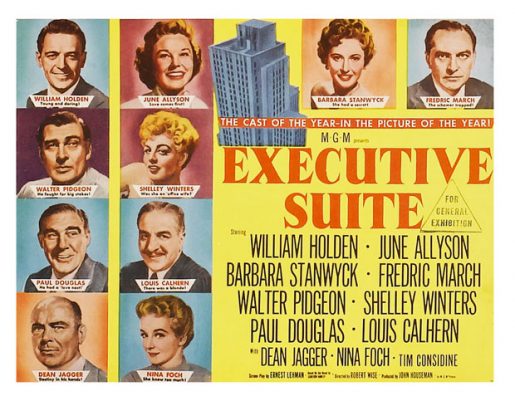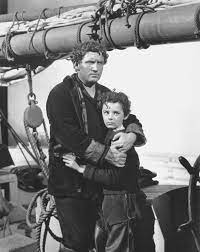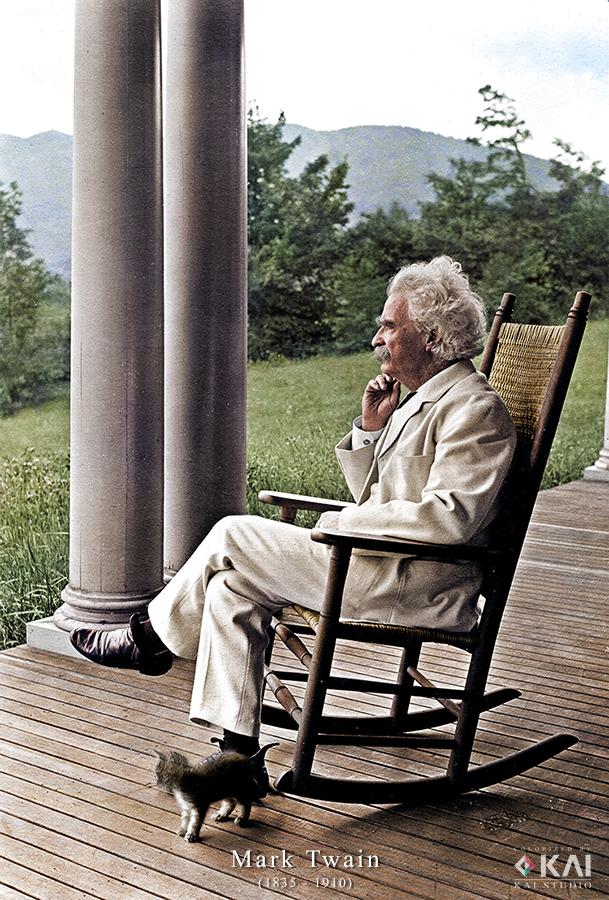John’s Top Ten Almost Forgotten Great Movies – Part 2
Here we are folks. My Final Five in my list of “Top Ten Almost Forgotten Great Movies.” As I did last week, I will briefly describe each movie and also explain what it was that appealed to me about the movie. Why am I listing it as a “Great Movie?” Why do I think you would not be wasting an evening to watch this movie on Hulu or Amazon Prime or Netflix or perhaps find it on YouTube? Even if you have seen these movies, any of them are well worth watching two or three times. IMHO.

- Executive Suite – 1954
It is the early 50’s. Some people would call this the era of “Happy Days” in America. We were the kings of the world. Europe, Asia, Russia were still recovering from the ravages of WW II. Africa was a developing country, and we were exploiting South America and the Mideast to get the oil and resources needed for our factories. Our American economy dominated the world. Everything was bought and sold in the USA except some cheap Japanese goods.
Deming was working with Japan under Mc Arthur to help them rebuild their economy. He promised them that if they followed his methods of Quality and Statistical Process Control (SPC), they would come to dominate the world market in ten years. Ten years was still far away by American standards. Profit and mass production ruled the psyches of almost every major CEO in the USA. Underneath the soft underbelly of our production-oriented economy was a split that was opening up that would destroy business as we knew it. It was a split that Deming was aware of and tried to warn us about, but he was regarded as an old fogey who was behind the time.
This split was a battle between Quality and Quantity. It involved a choice between getting it right or just getting it out the door as cheaply as possible. Deming told companies that they could have mass production and also quality by using Statistical Process Control. They laughed at him and as they tossed him out their doors, they told him
“That’s impossible. You can’t have quality and quantity both as the same time. We do not have time for SPC. We only have time to make as many products as fast and as cheap as we can. Our buyers are waiting for our products.”
And that brings us to the “Executive Suite.” The battle as seen by manufacturers between quality and quantity is the very plotline of the movie. “Executive Suite” had what today would be known as an “ensemble cast.” William Holden, Barbara Stanwyck, Frederic Marsh, June Alyson, Walter Pidgeon, Nina Foch, Shelley Winters, Dean Jagger, Tim Considine, Paul Douglas, and William Bouchey were just a few of the great actors that were in this movie. The movie went on to be nominated for four Academy Awards at the 27th Academy Awards in 1955
The basic plot of Executive Suite is very simple. The Tredway Corporation, once renowned for its fine products has fallen on hard times. The CEO (Avery Bullard) has just died, and since he did not name a successor, his Board of Directors must elect a new CEO. The company once known for its quality products has lost customers. In his later years, Bullard had “Lost his way” in the words of his chief production engineer played by William Holden.
The Chief Financial Officer (CFO) played by Frederic March had helped the founder take the company down the road of cheap products to be mass produced. William Holden described the Controller’s strategy as “fly specking” every penny to cut costs. The battle for the CEO is waged in and out of the board room as prospective candidates try to enlist the aid of other board members for votes and proxy votes. The actual battle comes down to quality or quantity. This battle would play out in many board rooms across the USA from the fifties to the early eighties. Who will win?
In real life America, cost cutting, and finance won out until the Japanese started “eating our lunch.” By 1980, when NBC published its Special Report, “If Japan can why can’t we?”, thousands of US companies had lost market share to the emerging Japanese quality juggernaut. I joined Process Management International in 1986 and met Dr. Deming at a seminar in San Francisco where I became one of his willing workers and acolytes. Dr. Deming was sometimes called the “Father of Japanese Quality.” The Deming Prize, (the highest award for quality in Japan) was named after Dr. Deming. He was quite a thrill and inspiration to work with.
So, who or what will win out in this low-key but thrilling movie? Watch it and see.

- Glengarry Glen Ross – 1992
The movie “Glengarry Glen Ross” was based on David Mamet’s 1984 Pulitzer Prize–winning play of the same name. Mamet in my opinion is one of the greatest playwriters of all time. He is also a filmmaker and author. You will never go wrong watching a film based on his stories or plays. They are always thought provoking and run against the grain of “action movies” and “shoot-em ups” that seem to dominate screens today.
Like “Executive Suite”, this movie also features an ensemble cast of some of the best Hollywood actors in history. The cast includes: Al Pacino, Jack Lemmon, Alec Baldwin, Alan Arkin, Ed Harris, Kevin Spacey, and Jonathan Pryce. The film was a box office failure. Nevertheless, many critics consider it one of the best movies of the 1990s.
Glengarry Glen Ross is about competition in the sales industry. The setting is a real estate office. The five salesmen are told by the sales manager Kevin Spacey, that a super salesman (Blake) from home office is coming down to “motivate” them. Blake (Played by Alec Baldwin) rips the men apart in a no hold bars speech that questions their virility and masculinity. He then tells them that only the top two closers will be kept on and the other men will be fired. When challenged by the salesman Dave Moss (Played by Ed Harris) Blake says:
“And to answer your question, pal, why am I here? I came here because Mitch and Murray asked me to. They asked me for a favor. I said the real favor, follow my advice and fire your fucking ass, because a loser is a loser!”
The dialogue in the film is often tough, raw, insulting, and difficult to listen to. You feel sympathy for the men who must do anything to make a “close.” “Closing” is making a sale. If you have ever dealt with real estate salespeople, car salespeople or insurance salespeople, you know how tenuous their link to integrity can be. In the “Ten Least Trusted Professions in America, three of the top ten include the professions I have noted above. My experience with these three professions would certainly support their inclusion in the top ten. The following comments in respect to the three professions noted are from Insider Monkey.
- Insurance Salesperson
“Insurance salespeople may face trust issues as they often demand potential hidden fees. They are also blamed for misinterpretation of policies and tend to always prioritize their commissions. It is hence inevitable that such a behavior creates doubts about their transparency and customer-centric approach.”
- Used Car Salesperson
“Used car salespeople are distrusted due to their dishonesty, selling faulty vehicles, and pressure tactics. This creates skepticism about their integrity and the quality of their sales. It is hence one of the least trusted professions in America.”
- Real Estate Agents
“Real estate agents are perceived to be responsible of potential conflicts of interest, commission-based motivations, and pressure to close deals quickly. Some past instances of dishonest practices in the US have also contributed to this narrative of lack of trust. Hence, it is one of the least trusted professions in America.”
The plot revolves around the efforts of the salespeople in this firm to obtain a set of leads which they hope will secure their jobs. Politics, greed, and corruption become normal parts of their lives. In a space of 24 hours, some of the men are willing to pull out all stops to keep their jobs. The dialogue is hard rough edged street vernacular. The men are victims of an exploitative capitalist system where getting a sale is more important than integrity. A perfect reflection of art imitating life. Every day we see examples of a system that rewards greed and perfidy and where lies and cheating are taken for granted. You would probably not be surprised to find that Lawyers and Politicians are also in the top ten least trusted professions in America. Ask yourself “What are they selling?”

- Carmen Jones – 1954
This movie was a combination drama, romance and musical. It was an Americanized remake of the Opera Carmen by George Bizet. It had an all-Black cast that included some of the great African American actors and singers of the day. Dorothy Dandridge, Harry Belafonte, Olga James, Pearl Bailey, Joe Adams, Diahann Carroll, Roy Glenn, and Brock Peters. Some of the Tenor and Bass lyrics were dubbed in by African American singers like Marvin Hayes and LeVern Hutcherson. Some of the Soprano lyrics were dubbed in by the wonderful Marilyn Horne who was White.
The screenplay by Harry Kleiner is based on the English lyrics and book by Oscar Hammerstein II, from the 1943 stage musical of the same name. The original score from Carmen was in French. The place setting for Carmen was Spain. Escamillo was a bull fighter. Don Jose was a soldier and Carmen was a Gypsy. In the remake, Escamillo becomes a boxer named Husky Miller whose lyrics are dubbed in by Marvin Hayes. Don Jose becomes Joe, a soldier played by Harry Belafonte whose lyrics are dubbed by LeVern Hutcherson. Carmen becomes “Carmen Jones” a cigarette girl played by the uber sexy Dorothy Dandridge. Dandridge’s lyrics were dubbed in by Marilyn Horne.
I love opera. I grew up on an Italian neighborhood in Brooklyn, NY. My father had all of Caruso’s 78’s. People on my block sat outside on Saturday nights singing opera on their porches. I loved listening to Enrico Caruso, Mario Lanza, Enzio Pinza, Giuseppe Di Stefano, Franco Corelli, Mario Del Monaco and much later Placido Domingo and of course Luciano Pavarotti. Saturday afternoon was opera in the afternoon on the radio. I always dreamed that if I was reincarnated, I would come back as a great Italian tenor.
“Carmen Jones”, whether you want to call it a movie or stage play, was still a tragic opera. The handsome soldier Joe is engaged to be married to the sweet girl next door Cindy Lou, played by Olga James. He is seduced by the cigarette girl Carmen and deserting his post runs off with her. Tragic operas do not end “happily ever after.” I will say not anymore about the plot.
Carmen is the “no good girl” that men lust for. She lives for the moment. She loves for the moment. She seduces whoever takes her fancy for the moment. She sings a famous aria, “The Habanera” in which she proclaims:
If you don’t love me, I love you
Beware
But if I love you, if I love you
Beware
The bird you thought you’d surprise
Flapped its wings and flew away.
I have seen some operas made into musicals like Madame Butterfly into Miss Saigon and La Boheme into Rent. These were adapted for a modern audience and the lyrics translated into English. I have never seen any as well done as Carmen into Carmen Jones. The music and lyrics embody the essence of the original opera to a degree that I would not have thought possible. For instance, in the Bizet Opera, Escamillo sings in the famous “Toreador Song”:
The bull goes, he comes
He comes and strikes again
By shaking his banderillas
Full of fury, he runs
The circus is full of blood.
(The original lyrics are sung in French)
In Carmen Jones, Husky Miller the boxer sings “Stand up and Fight”:
Stan’ up an’ fight
until you hear de bell,
Stan’ toe to toe,
Trade blow fer blow,
Keep punchin’ till you
make yer punches tell,
Show dat crowd watcher know!
Until you hear dat bell,
Dat final bell,
Stan’ up an’ fight like hell!
The movie musical opera “Carmen Jones” has every bit of the drama, passion and musical quality of the original opera Carmen. I will not say any more because I am very biased here. Watch it when you have a chance. Whether or not you love opera, if you love music, you will love Carmen Jones.

- Captains Courageous – 1937
“Captains Courageous” is the story of a young, spoiled child who learns humility and compassion for others. It is a sad but ultimately heart-warming story of the bonding between a rough immigrant sailor Manuel played by Spencer Tracy and a rich privileged child Harvey played by Freddie Bartholomew. Again, another ensemble cast of great actors make up this film. You may remember names like Lionel Barrymore, Melvyn Douglas, Mickey Rooney, John Carradine, Spencer Tracy and a then 13-year-old child actor named Freddie Bartholomew. Freddie was nominated in 1999 as one of the 250 Greatest Male Screen Legends by the American Film Institute.
The film took twelve months to shoot and took place mostly at sea. From a story by Rudyard Kipling, the plot revolves around the transformation of a young boy named Harvey played by Freddie Bartholomew. He is picked up by a fishing boat after falling off his father’s yacht. He demands to be returned immediately to his father. The fishermen refuse since it is financially impossible for them to stop their work and just go looking for the brat’s father. There is always the question of whether or not the boy is really telling the truth about his father being so rich. He is put to work for the first time in his life with chores and responsibilities. Freddie goes from spoiled brat to mature and responsible young man.
At first, he refuses to do any work, so they refuse to feed him. In time, he begrudgingly starts to do the work assigned. He is taken under the wing of the great Spencer Tracy who plays Manuel an itinerant fisherman. They form a bond which is touching, and the end of the movie will bring tears to the eyes of even the most hardened cynic. Spencer Tracy won the Academy Award for Best Actor for his work in this film. The movie was also nominated for three other Academy Awards. That is all I am going to say. Go do yourself another favor and watch one of the great movies of all time.

- 12 Angry Men – 1957
I can identify with this movie because I was a jury foreman in 1996. Three months after the trial ended, I was hauled into court facing a possible charge of jury tampering.
“Appellant was convicted of disorderly conduct and acquitted of assault in the fifth degree. Appellant moved to dismiss based on legally inconsistent verdicts. The court denied appellant’s motion. Prior to appellant’s sentencing, the court presented the parties with a copy of ‘Observations on Quality in the Courtroom: By a Juror,’ written by jury foreman Dr. John Persico, Jr., which alleged racial bias and misconduct by the jury. Appellant moved for a new trial, but the motion was denied.”
Minn. Stat. § 480A.08, subd. 3 (1996).
STATE OF MINNESOTA
IN COURT OF APPEALS
C9-97-1608
State of Minnesota,
Do I have to say it? I am starting to sound repetitious. It had an ensemble cast. Awesome lineup of some of the best actors to ever step foot in Hollywood. Some of the twelve jury members included Henry Fonda, Lee J. Cobb, Joseph Sweeney, Martin Balsam, Jack Klugman, E. G. Marshall, Jack Warden, and Ed Begley. “12 Angry Men” is a 1957 American legal drama film directed by Sidney Lumet, adapted from a 1954 teleplay of the same name by Reginald Rose.
The film tells the story of a jury of 12 men as they deliberate the conviction or acquittal of a teenager charged with the murder of his father. At first it appears that eleven of the jurors believe that the boy is guilty. One holdout Juror 8 played by Henry Fonda still has a reasonable doubt. His nemesis Juror 3, played by Lee J. Cobb angrily disagrees and becomes the antagonist to Fonda’s protagonist. The battle for conviction between the two jurors finds the other jurors torn from one side to the other. Evidence is presented. Logic versus emotions creates rages in the jury room. Not one juror can escape the heated arguments that ensue. The conflict highlights the moral dilemmas that face all of us when we must decide the life or death of another human being.
“12 Angry Men” received acclaim from critics, despite a mediocre box office performance. At the 30th Academy Awards, it was nominated for Best Picture, Best Director, and Best Screenplay. It is regarded by many as one of the greatest films ever made.
If you have ever been on a jury, you may have some empathy for the “12 Angry Men” in this movie. My jury misadventures helped me to see the strengths and weaknesses of the jury system. A jury is only as good as the people on it. But as Hubert Humphrey once said, “A democracy is a system that achieves extraordinary results with ordinary people.” In the end, there will never be enough extraordinary people to make a difference. We will always have to rely on the common man and common woman to keep our democratic system of government strong.
Conclusions:
A great movie needs a stellar cast. It needs a great script. It needs a great screenplay. It does not need people murdered or shot in one scene after another. It does not need endless chase scenes. It does not need grotesque scenes of people getting their bodies torn limb from limb. Perhaps subtlety is a lost art. One of the most moving and sad scenes I ever saw in a movie was from a Gary Cooper movie. He arrives home after a band of Indians have attacked his home. The house is in flames. He goes looking for his wife. He finds her on the other side of a rock fence. You do not see her body. You only see the look on his face. It is heart breaking. I get teary eyed just thinking about it. You do not need to see her broken battered bloody body to know what happened to her.
That’s All for Now Folks!
Leave a comment if you enjoyed my writeups or just go watch the movies.














